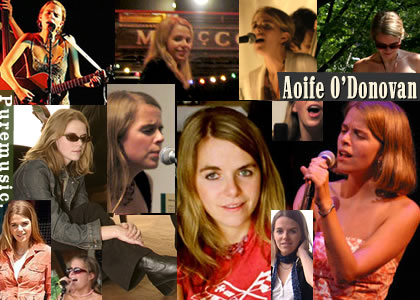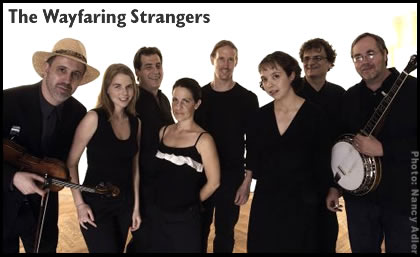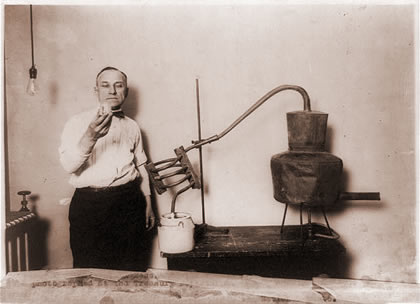
A Conversation with
Aoife O'Donovan
(continued)
PM: So were you personally exposed to old-time stuff and other music through your folks? Is that the right story?
AO: Yes, definitely, my dad--well, both of my parents are amazing musicians, my mom especially is the real musician. And my dad is sort of a music person. He's kind of in the music business. And he does a radio show Boston. And I grew up spending all my summers in Ireland with his family, who were very musical, and singing songs. And his radio show is traditional Irish music, but he was always sort of playing lots of that, as well as lots of other kinds of folk music--not necessarily old-time music, though. I don't think I really got into old-time music until I got to college, until I kind of met Rushad and Greg and all those people in Boston.
PM: Ah, you found that with them, yeah.
AO: Yeah. But it was definitely the similar songs. Like I knew those songs from Joan Baez, or I knew those songs from Irish traditional music, where the songs are the same, except they're from County Cork instead of Louisville, or something.
PM: Exactly.
AO: So it was definitely familiar to me.
PM: So although your vocals define their sound as much as anything does, you don't get to play too much on Shaken By A Low Sound. Is that one of the reasons for forming Sometymes Why, as well as being an outlet for your own songs?
AO: Definitely not. I think instrumentally, but I'm a singer. When somebody asks me what I do, I say I'm a singer.
PM: Right.
AO: That's what I studied in college, that's my craft, that's my instrument, is singing, my voice. And I have this degree in voice, that's what I studied the way the people study the piano.
PM: Right. So if you were at NEC, and you were studying voice, does that mean you went whole aria route, and studied opera?
AO: No, I didn't do classical. I was in the Improvisation Department. At NEC, there's this whole Jazz and Improvisation Department.
PM: Ah.
AO: So that was what I was studying there. And I did take voice lessons all through college. I studied classical voice in high school. So I do really feel like I've been able to use my voice in ways that people are able to use their instruments, knowing where to go and what to do.
PM: I think you're one of the most important new vocalists out there, no question, a just really, really important new voice.
AO: Thank you.
PM: So how did Crooked Still meet and get together with [producer] Lee Townsend? [Puremusic readers may recall this name in connection with Bill Frisell, Kelly Joe Phelps, etc. you can use our search engine.]
AO: Well, we were in Northampton with our record label executive, Jim Olsen [Signature Sounds]. And we were trying to decide who was going to produce our record. We were really stuck. We couldn't think of who we wanted to produce it. And Jim had this suggestion of Lee Townsend. His name had maybe been tossed around before, but we really loved all his records, because he's amazing.
PM: He's really something, yeah.
AO: Unbelievable. And we were going out to California a couple weeks later, and we met him. He came to our show at the Freight & Salvage in Berkeley.
PM: You met him at the Freight & Salvage. That's amazing.
AO: Yeah. And we said, "We want you to produce our record." Just like that. [laughs]
PM: Wow. So what kind of a cat was he to work with as a producer?
AO: He's really chilled out, and he's really a very cool guy, and he's really mellow, which is really nice for Crooked Still to deal with somebody who's really kind of getting us in this mellow vibe, because we definitely have a tendency to play things too fast [laughs] as most bluegrass bands do.
PM: [laughs]
AO: So it was kind of all about slowing it down, and just really getting into the groove, which I think really comes across in Shaken By A Low Sound. And I love the sound of the bass on that record. It just does not sound like a folk record. It sounds like the bass is super super big.
PM: Yeah, God knows he's worked with a lot of great bass players.
AO: Exactly. I think that was very cool to get that bass sound. All of those sessions were pretty much live. It was very organic process in the studio. We were separated in four rooms, but we recorded everything pretty much--
PM: Could you see each other?
AO: We could see each other.
PM: Yeah. Isn't that what really matters?
AO: Yeah. We recorded everything pretty much live, including the vocals, which is really fun to do, to get to sing with the guys and interact with them. And people can hear that interaction, I think, especially between me and Rushad, on the record.
PM: Right. [laughs] Oh, I can't wait to see those YouTube videos now.
AO: Yeah.
PM: So let's talk about that other project, The Wayfaring Strangers. I don't know how you juggle all these great bands. But tell us something about that band.

AO: Well, Wayfaring Strangers is not really playing too much these days. But during its heyday, Wayfaring Strangers was a super fun project, because it's bluegrass--it's these old bluegrass songs, but the three-part vocals are just such a blast to go for, because you're singing loud, it was belting, it was really fun. And being on stage with all those great musicians, Tony Trischka, Matt Glaser and the jazz element added, with Laszlo Gardony on piano, and Jamey Haddad on the drums. I actually just talked to him on the phone the other day. But it was just really fun. And Ruth and myself and Tracy Bonham were the three singers for that project.
PM: Right.
AO: And we played Merlefest a couple years ago, and that was a blast.

print (pdf) listen to clips puremusic home